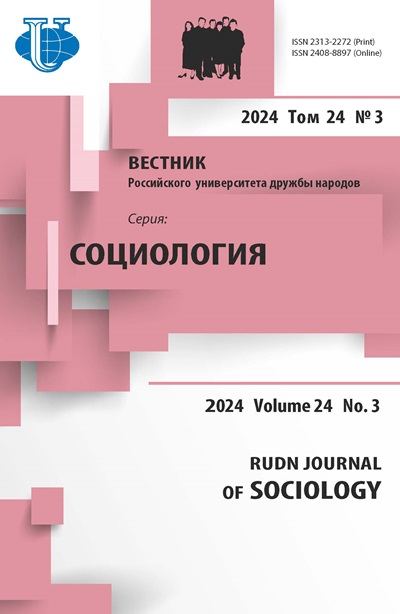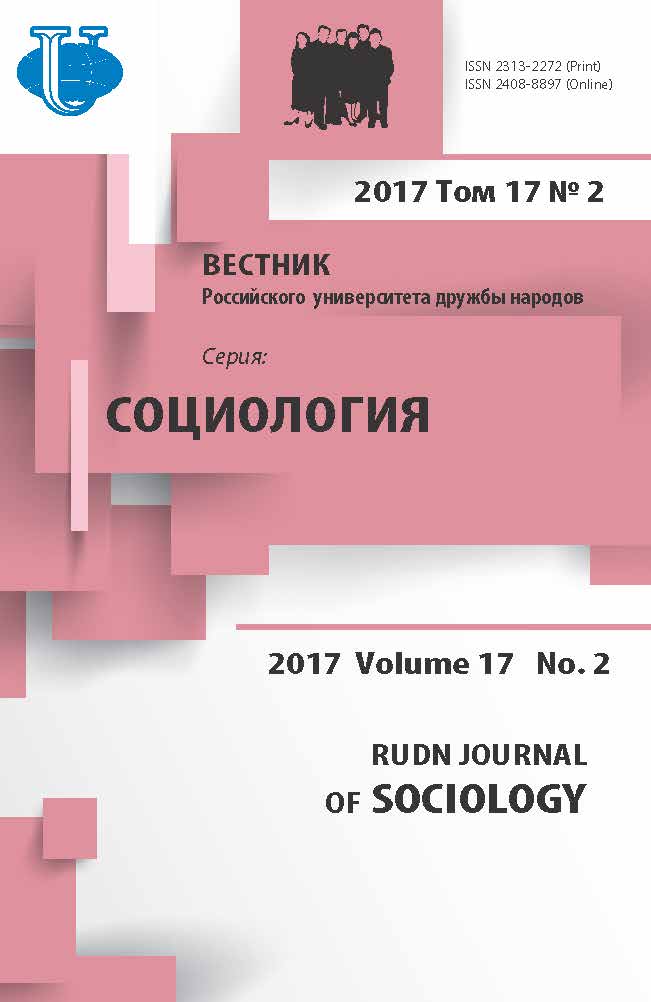Vol 17, No 2 (2017)
- Year: 2017
- Articles: 11
- URL: https://journals.rudn.ru/sociology/issue/view/954
- DOI: https://doi.org/10.22363/2313-2272-2017-17-2
Full Issue
Theory, Methodology and History of Sociological Research
Postmulticulturalism: Some approaches to the study of contemporary social and cultural processes
Abstract
Postmulticulturalism is a way to conceptualize social and cultural diversity under the globalization. Unlike multiculturalism that developed as a nation-state project postmulticulturalism considers the tendencies of fluidity, processuality, and overcoming institutional constellations and national boundaries. Postmulticulturalism allows a specific vision of contemporary problems, thus contributing to the understanding of the role and functions of the nation state under the globalization, to the redefining of integration in national and transnational contexts, and to the transition to dialogue forms of maintaining social and political unity within the nation. Thereafter the authors consider a ‘postmulticultural turn’ in social sciences, which is associated with managing cultural diversity and allows the nation state to rethink itself in the postmulticultural perspective. Postmulticulturalism contributes to the development of new conceptual and discursive spaces, and to the practical explications of the changing reality under the recurrent transitions between old and new, the past and the future. Postmulticulturalism is a stage in the development of a multicultural ideology aimed at deessentialization of ethnicity and overcoming cultural discrimination. However, it does not deny multiculturalism as a way to conceptualize new social and cultural realities and migration situation in nation states that are supported by various multicultural policies and provide the postmulticultural approach with the impulses for social and cultural dynamics relevant for the contemporary society.
 145-156
145-156


“Periphery”, state, and revolution, or Russia’s morphology of “backwardness” (Part 2)
Abstract
 157-179
157-179


On the reasons of radical forms of social protest: Reflections about principles of ‘Malthusian trap’ and demographic factors
Abstract
The article considers reasons for radical mass forms of social protest in the context of the ‘Malthusian trap’ and structural-demographic theory of Jack Goldstone, which have become popular in the last two decades. The author critically evaluates these two conceptions and comes to the conclusion that the principles they underline are just concomitant factors, i.e. additional risk factors for political systems and regimes, rather than causes of radical mass forms of social protest. The author suggests a method of analysis that consists of studying the circumstances, i.e. the wide historical context, in which mass forms of social protest usually emerge, and provides a large number of illustrative examples. The scientific approach to the identification of social-historical determinants of radical forms of social protest implies that if something is a reason/cause of an event, then this reason/cause must be present whenever there is such an event both alone or within a complex of concomitant factors. The ‘Malthusian trap’ and demographic factors cannot be traced in all manifestations of radical mass forms of social protest in modern and contemporary history. Moreover, the ‘Malthusian trap’ and demographic pressure on the economy and social system do not always lead to mass forms of social protest. The wave of radical forms of social protest in the last decade, i.e. the so-called ‘color revolutions’, ‘Arab spring’, protest actions in France, England and the USA, once again confirms the relevance of the author’s approach and the importance of critical study of the traditional conceptions.
 180-191
180-191


Rules of political communication in the pre-war Soviet countryside
Abstract
 192-201
192-201


Moscow school of social organization
Abstract
The article considers Moscow Sociological School of the 1960s - 1970s, which originated on the basis of the research project “Social Organization” developed by talented Moscow sociologists and philosophers. Under the leadership of N.I. Lapin, they made a methodological breakthrough that was not correctly understood at that time and is still underestimated. The concept “labor collective” used by the overwhelming majority of Soviet scientists to describe personnel of an industrial enterprise or a working team had a huge ideological potential and was politically engaged. This concept helped not to explain the empirical data, but rather to demonstrate the high socialist morality of the working class and its solidarity with the leading party cell. The sector for the study of labor collectives was established in 1968, and in 1969 it was transformed into a department focusing on the world science achievements. Due to the thorough study of such innovations, the concept “labor collective” gradually evolved into a more fruitful and promising concept “social organization”. Such a methodological move allowed to use the system approach that was popular at that period, to rely on the findings of Western sociology, mainly on the structural-functional analysis, and on the motivational models of social interaction developed in management. In just five years, participants of the project conducted 28 empirical studies of 100 objects. The total number of respondents was about 25 thousand. The list of publications of the project participants consists of 35 monographs, 10 thematic collections and more than 50 articles (more than 600 publications in total). The team of scientists was dismissed for political reasons.
 202-212
202-212


Contemporary society: the urgent issues and prospects for development
Globalization of international migration: Social challenges and policy implication
Abstract
 213-224
213-224


The impact of spiritual and moral values of the youth on the Russian society civil culture
Abstract
The authors conducted a sociological analysis of the spiritual and moral values of the youth and their impact on the civil culture, which largely determines the forms of individual and group social activity and the functioning of social institutions. The implementation of the key function of values, i.e. the achievement of material goods and the spiritual development, to a certain extent, will allow to overcome the cultural gap between elites and common citizens, which is considered one of the main reasons for the failure of reforms in Russia. The study of transformation processes determined great interest in the social potential of the youth as a subject of social reproduction, and the civil culture is a key factor and element of modernization for it changes and activates value orientations of the younger generations and leads to the qualitative transformations of all spheres of society. The article is based on the empirical data of a number of sociological surveys conducted in 2016 in five cities of the south of the Tyumen Region. The empirical data prove that there is an obvious emerging shift from paternalistic expectations, passivity and low estimates of the future to the rationality, individualization and self-reliance. The authors emphasize the influence of mass media as one of the factors of the civil culture formation, which is evident in the impact of media on the moral and spiritual values of the younger generations.
 225-234
225-234


Longitude studies of the patriotic mood of school youth in polyethnic regions (results of sociological surveys)
Abstract
The article considers the formation of the patriotic mood of school youth in polyethnic regions of the Russian Federation based on the data of large-scale longitude generational studies that have been conducted since 1998 and are unprecedented in scale for both Russian and Western research tradition. The surveys have been conducted in twelve regions: Astrakhan and the Astrakhan region, Groznyy, Ivanovo, Krasnodar, Maikop, Makhachkala, Moscow, Nazran, Nalchik, Pskov and Stavropol. The project focuses on the views and values of the younger generations, on their conflict and tolerance potential. The main goal of the project is to support the younger generations capable of confronting and overcoming life difficulties, of suppressing one’s negative and conflict reactions, of protecting one’s interests and respecting the interests of others, which would lead to the development of culture of tolerance and consent and to preventing xenophobia manifestations. For the study of ethnic-social attitudes, for the identification of conflict potential, for the prevention of conflicts and manifestations of xenophobia and extremism, the researchers developed an ethnic-conflict monitoring in the framework of the international project “Dialogue Partnership as a Factor of Stability and Integration” (“Bridge between East and West”) and the program “Youth of Polyethnic Regions: Views, Attitudes, Values” (the author is the founder and the head of the project and the program). The monitoring has been conducted for 29 years in the form of generational studies that aim to reveal the development of the youth ethnic consciousness in different regions, and to ensure a timely influence in order to reduce conflict potential and to support the culture of tolerance.
 235-252
235-252


Influence of spiritual and moral values of young people on the formation of the civic culture of the Russian society
Abstract
The article presents a sociological analysis of the spiritual and moral orientations of young people and their influence on the formation of civic culture, which largely determines the form of the activity of individuals and social groups, the functioning of social institutions. Implementation of the objective function value consists in the achievement of a modern person in not only different kinds of material goods, but also, more importantly, in spiritual development. This, to a certain extent, will help to overcome the cultural gap between the elite of society and the main mass of citizens which can be considered as one of the important reasons for the failure of reform in Russia. Research of transformation processes have aroused great interest in the study of the social potential of youth as a subject of the reproduction of society. One of the factors in favor of subjectivity of youth is a civic culture, which is a key element of modernization. As a result of its formation, there is a change and activation of value orientations of young people, causing a qualitative transformation in all spheres of society.
The empirical base of an article presents the results of original research conducted during 2016 among residents of five cities on the south of the Tyumen region, on the basis of which the authors point out the emerging shift from paternalistic expectations and passivity, the low value of the future to rationality, individualization, orientation on their own power. As one of the factors in the formation of civic culture the potential of the media were highlighted, which allowed the authors to justify the impact of the media on the formation of moral and spiritual values of the younger generation.


Reviews
Mastering one’s age. Ivanov V.N. Ot 70-ti do 100: razmyshlenija i vospominanija [From 70 to 100: Reflections and Memories]. - M., IPO «U Nikitskih vorot», 2017. - 168 s
 253-255
253-255


Authors
Authors
 256
256

















